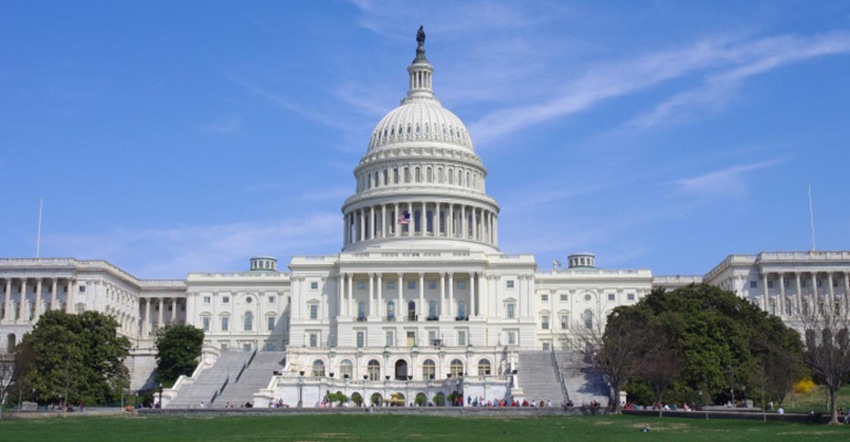What’s the latest activity in Washington D.C. and how will it impact your beef cattle enterprise? Here’s a roundup of recent headlines.
June 28, 2020

In this election year, there are days it seems I’m tied to my phone, trying to soak up as much information as I can to know what’s coming up, what decisions are being made that might impact my life and how politicians and the media are maneuvering through this very interesting year.
Then there are days when I’m so disgusted by everything I read, and I’m just grateful I live in the middle of nowhere where the craziness can’t touch me. I unplug and head outside to work; being surrounded by green grass and grazing cattle seems to make everything in the world make more sense.
Although it would be nice to just go off the grid and pay this crazy world no mind, the fact of the matter is there are many decisions politicians make on a daily basis that trickle back to our ranch and impact how we do business.
It’s important to keep a critical eye on the activity happening with our local, state and federal government. Common sense needs to prevail in these discussions, and if we choose to sit things out, we miss an opportunity to encourage positive change or forward action that will benefit the agricultural community and our consumers alike.
So what’s new in Washington, D.C.? I’ve rounded up a few articles that might be of interest.
1. The new WOTUS rule went into effect last week.
According to the Capital Press, “The rule replaces the contentious 2015 Waters of the United States rule, known as WOTUS, providing clarity on which waters are regulated and maintaining important exemptions for agriculture.”
Pendley, of Wyoming, currently serves as the BLM deputy director for policy and programs.
According to the White House, “In this role, he has worked to increase recreational opportunities on and access to our nation’s public lands, heighten concern for the impact of wild horses and burros on public lands, and increase awareness of the Bureau’s multiple-use mission.”
Of this nomination, Kaitlynn Glover, National Cattlemen’s Beef Association (NCBA) executive director of natural resources and Public Lands Council executive director, said in a press release, “We appreciate the President’s focus on providing permanent leadership at the BLM. The BLM manages millions of acres that are critical to Western communities and livestock producers. Strong leadership is a key component in providing certainty in these uncertain times. Mr. Pendley has strong connections to the West and we look forward to working with him. I urge the Senate to move swiftly through the confirmation process.”
3. New bill would fine protestors up to $25K for interfering with livestock haulers
While this bill was passed in Canada, I’m certain U.S. truckers are considering ways to protect themselves on the road.
According to CDL Life, “A recently passed bill will allow authorities in Ontario to issue large fines to protesters who interfere with the transport of livestock. On June 18, the Ontario government passed Bill 156, also known as the Security from Trespass and Protecting Food Safety Act, 2020. The bill is intended to protect health, safety, and the food supply chain by punishing those who trespass on private property in order to steal or interact with farm animals.”
American Trucker reports, “A recent poll found 78% of U.S. truckers would not deliver to areas where police are defunded or disbanded.”
However, Kellylynn McLaughlin, of the Women In Trucking Association, said, “We will continue to fulfill our essential role as professional drivers until it is not safe just as we have been doing during COVID-19.”
According to Stephen R. Miller for Fern’s Ag Insider, “The Processing Revival and Intrastate Meat Exemption Act, or PRIME Act, has been kicking around Congress in several iterations since 2015 but has recently seen a surge of new attention among lawmakers. If enacted, it would lift a federal ban on the sale of meat butchered at small, custom slaughterhouses and create a much-needed alternative to factory-sized plants for farmers with meat that is ready for market.
“In Wyoming, a new law slated to take effect in July may offer a proving ground. It will allow ranchers to sell shares of live cattle to customers, making them part owners of the animals before slaughter. Like the PRIME Act, it’s a workaround designed to give local ranchers a fighting chance on an uneven playing field.”
5. Republicans seeks to help small meat processors
According to Jacqui Fatka for Feedstuffs, “Republicans on the House Judiciary Antitrust Subcommittee are calling on the U.S. Department of Agriculture to revisit regulations that create barriers for small meat processors. In a letter to Agriculture Secretary Sonny Perdue, the members said the ‘high cost of complying with meat processing laws has made it hard for smaller processors to compete and has led to significant consolidation in the industry.’
“In a letter, Reps. Kelly Armstrong (R, N.D.), Jim Jordan (R, Ohio), Jim Sensenbrenner (R, Wis.), Ken Buck (R, Colo.), Matt Gaetz (R, Fla.) and Greg Steube (R, Fla.) stated that reducing regulatory burdens will increase competition and strengthen a crucial industry at an important time.”
6. Livestock market disruptions create new push for Mandatory Country of Origin Labeling (MCOOL)
According to an article that weighs the pros and cons of MCOOL, “Major disruptions in the cattle and hog markets, one of the several fallouts of the COVID-19 pandemic, have led to many conversations about policy options that might be helpful.
One much-discussed solution is mandatory country of origin labeling.”
What other industry issues are you keeping an eye on? Shoot me an email at [email protected] to alert me to things I should be aware of.
The opinions of Amanda Radke are not necessarily those of beefmagazine.com or Farm Progress.
About the Author(s)
You May Also Like





